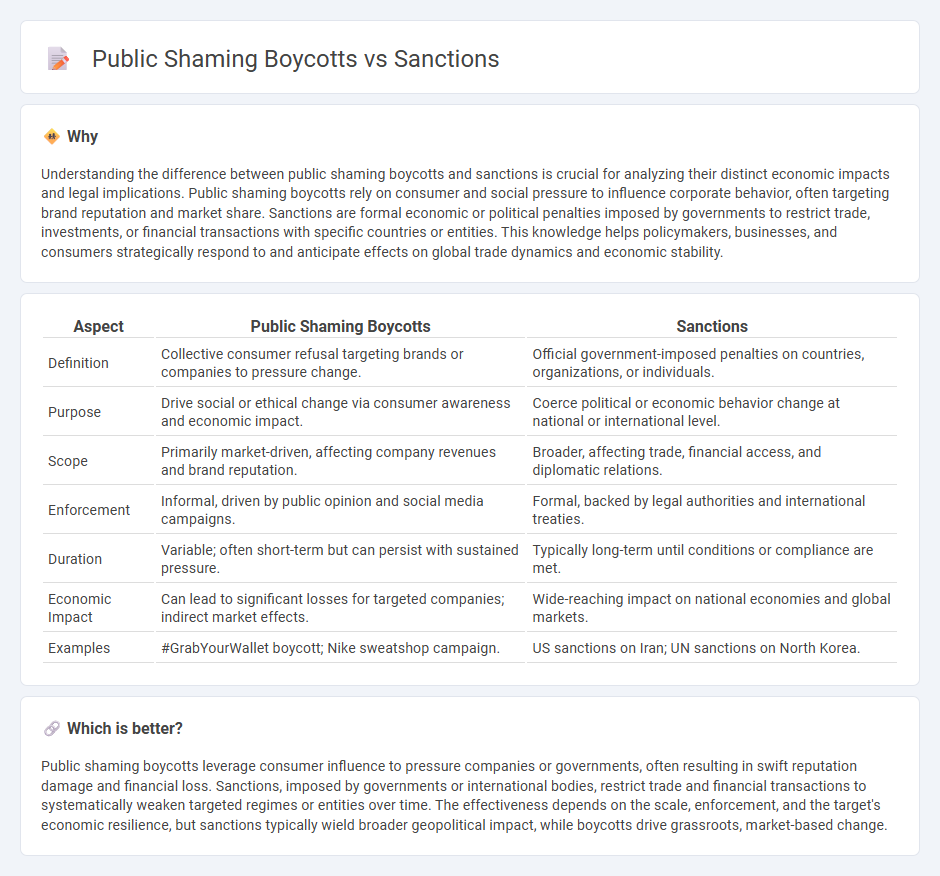
Public shaming boycotts leverage consumer power to impact companies by influencing brand reputation and sales, often driven by social media campaigns. Sanctions, typically imposed by governments, utilize legal and economic restrictions to pressure targeted countries or entities, affecting trade, finance, and diplomatic relations. Explore how these distinct economic tools shape corporate behavior and international policy dynamics.
Why it is important
Understanding the difference between public shaming boycotts and sanctions is crucial for analyzing their distinct economic impacts and legal implications. Public shaming boycotts rely on consumer and social pressure to influence corporate behavior, often targeting brand reputation and market share. Sanctions are formal economic or political penalties imposed by governments to restrict trade, investments, or financial transactions with specific countries or entities. This knowledge helps policymakers, businesses, and consumers strategically respond to and anticipate effects on global trade dynamics and economic stability.
Comparison Table
| Aspect | Public Shaming Boycotts | Sanctions |
|---|---|---|
| Definition | Collective consumer refusal targeting brands or companies to pressure change. | Official government-imposed penalties on countries, organizations, or individuals. |
| Purpose | Drive social or ethical change via consumer awareness and economic impact. | Coerce political or economic behavior change at national or international level. |
| Scope | Primarily market-driven, affecting company revenues and brand reputation. | Broader, affecting trade, financial access, and diplomatic relations. |
| Enforcement | Informal, driven by public opinion and social media campaigns. | Formal, backed by legal authorities and international treaties. |
| Duration | Variable; often short-term but can persist with sustained pressure. | Typically long-term until conditions or compliance are met. |
| Economic Impact | Can lead to significant losses for targeted companies; indirect market effects. | Wide-reaching impact on national economies and global markets. |
| Examples | #GrabYourWallet boycott; Nike sweatshop campaign. | US sanctions on Iran; UN sanctions on North Korea. |
Which is better?
Public shaming boycotts leverage consumer influence to pressure companies or governments, often resulting in swift reputation damage and financial loss. Sanctions, imposed by governments or international bodies, restrict trade and financial transactions to systematically weaken targeted regimes or entities over time. The effectiveness depends on the scale, enforcement, and the target's economic resilience, but sanctions typically wield broader geopolitical impact, while boycotts drive grassroots, market-based change.
Connection
Public shaming, boycotts, and sanctions are interconnected economic tools used to influence corporate and governmental behavior by targeting reputational and financial interests. Boycotts disrupt revenue streams directly by encouraging consumers to avoid certain products or services, while sanctions impose legal restrictions on trade or financial transactions with specific entities or nations. These mechanisms collectively pressure entities to align with social, ethical, or political standards, leveraging economic impact to drive change.
Key Terms
Trade Restrictions
Trade restrictions imposed through sanctions effectively limit a country's economic activities, targeting industries critical to national security or human rights violations. Public shaming boycotts primarily influence trade by encouraging consumers and businesses to voluntarily cease transactions, leveraging reputational damage rather than formal legal barriers. Explore the distinct impacts and mechanisms of these trade-related actions to understand their strategic use in global diplomacy.
Social Pressure
Sanctions impose legal or economic penalties to enforce compliance, while public shaming boycotts leverage social pressure to influence behavior and reputation. Social pressure operates through collective actions such as public criticism, social media campaigns, and consumer boycotts that impact the targeted individual's or organization's social standing. Explore how social pressure tactics differ in effectiveness and application across various contexts.
Consumer Behavior
Consumer behavior varies significantly between sanctions and public shaming boycotts; sanctions legally restrict trade or transactions, compelling compliance through penalties, while boycotts rely on voluntary consumer decisions driven by ethical or social concerns. Public shaming boycotts often generate strong emotional responses, influencing brand reputation and fostering community-driven market shifts that can be more flexible and immediate than formal sanctions. Explore deeper insights into how these mechanisms shape purchasing choices and market dynamics.
Source and External Links
What Are Economic Sanctions? - Economic sanctions involve withdrawal of trade and financial relations to achieve foreign and security policy goals, often implemented through UN Security Council resolutions such as asset freezes, travel bans, and arms embargoes.
Economic sanctions - Economic sanctions are penalties applied by states or institutions targeting countries, groups, or individuals, commonly including trade bans and financial restrictions against countries like Iran, Russia, China, and Cuba.
What are sanctions? - Sanctions are legal economic and political measures imposed to influence behavior of states or groups, such as freezing assets or trade restrictions, and are intended to be temporary and regularly reviewed.
 dowidth.com
dowidth.com